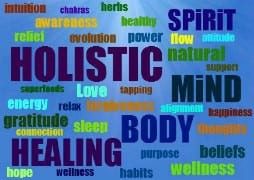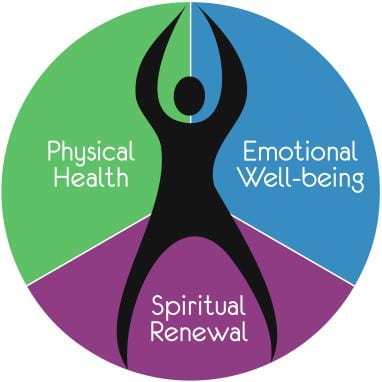What is Holistic Medicine?
Blue indicates link
Holistic treatment is a form of healing that takes the entire person into account.
Holistic medicine is NOT medical treatment.

The idea that all the elements of a human being must be considered in order to promote optimal health and wellness comes from holism. Holism is a philosophy that promotes the primary goal of ultimate health and wellness. Working in unison with conventional medicine, holistic treatment is designed to incorporate various forms of “alternative therapies” to reach its aims.
Holistic treatment is a medical treatment option that promotes healing by treating the entirety of the person based on the principle that when one part of the person is ignored or out of balance, it causes the entire system to become imbalanced. If treatment is only given to one part, the patient cannot really experience full healing because other aspects of their being are being ignored.
Holistic treatment has a few main principles that make up the philosophy behind it, including:
Achieving Optimal Health: This is the main goal of holistic treatment. Optimal health, or when the person is doing well mentally, physically, and spiritually is the epitome of successful holistic treatment.
➢ Love: Holistic practitioners believe that love has monumental healing powers that can be used to help patients fight disease. Healthcare providers who practice holistic treatments focus on interacting with their patients in a way that promotes kindness, grace, unconditional acceptance, and abounding spirit. They believe that love, like laughter, is one of life’s most potent healers.
➢ Relationships: In modern medicine, it’s easy for a patient to become another number or a statistic. Holistic treatment strives to treat every patient as the unique individual they are in order to create close relationships. Holistic care practitioners believe that this deep patient-doctor relationship will allow patients to have a hand in their treatment.
The Origins of Holistic Medicine:
Healing traditions that date back as far as 5,000 years and originating from India and China centered on the concept of living in harmony with nature. The philosopher Socrates in all his wisdom, stated, “for the part can never be well unless the whole is well.” The term “holism” was first coined by Jan Christian Smuts in 1926 to describe a “whole that is greater than the sum of their parts.” However, the term holistic did not reach modern vocabulary until the 1970s.
With the advent and great advances in modern Western medicine, the holistic approach took a backseat as people’s excitement over medical fixes grew. But, once it became evident that modern medicine could not cure everything, that certain chronic conditions did not respond to conventional treatments, and that some treatments may actually cause more harm than good, the holistic approach was revived.
The holistic approach as it applies to curing and treating various diseases and conditions became a much more attractive option, but, it goes even further. Today, a holistic health lifestyle meets the growing demands of those looking to reach a maximum level of vitality, well-being, and general health.
How Does Holistic Medicine Work?
Holistic treatment is used to explore the entirety of the person to find potential underlying problems of their disease or affliction and to then address those as applicable in the treatment plan. When a patient walks into a holistic practitioner’s office, they will receive a complete evaluation, including, an in-depth look into their history, lifestyle, thoughts, and feelings, and be given treatment options based on who they are as a person.
Holistic Doctors and Their Methods.
➢ Patient education for lifestyle changes and self-care
➢ Different therapies and treatments
➢ Medications, surgeries, and other procedures
➢ Exercise and diet change
➢ Spiritual counseling
➢ Mental health, and relationship counseling
Each of these options is used to explore the inner corners of the patient’s life in order to rule out other causes and underlying problems. It’s all part of the unique holistic treatment.
Benefits of Holistic Treatment:
➢ A direct hand in their treatment so that they are included and consulted every step of the way.
➢ Alternative medications and treatments that are effective, but also gentle, non-invasive, natural, and ensure the lowest possible risk of harm.
➢ Being seen as a person and not a disease. In short, holistic treatment comes with the benefits of complete health and wellness through a variety of treatment options that best suit the patient. These are designed to address and heal the whole person by including their mind, body, and spirit in all treatment options and plans.
Holistic Medicine:
Holistic medicine branches from the holism philosophy which promotes the belief of treating, and therefore healing the whole person. A large part of holism focuses on the idea that in order to accomplish full healing, these three parts of a human being must be treated in unison. It is thought that if one or more parts are ignored, it can throw the person and their entire system off balance, thus making full healing impossible.
The combination of these practices is ultimately used to encourage health and wellness while preventing and treating disease by identifying all causative elements. One of the most attractive aspects of this form of treatment is the way the patient is treated. While modern medicine seems to view the sick person as an example of an illness, holistic medicine views the person as an individual with thoughts, feelings, and history. When looking at the patient as a person, practitioners are able to develop a treatment plan that embodies each individual patient’s mind, body, and spirit.
Principles of Holistic Medicine
Holistic medicine is also based on the belief that unconditional love and support is the most powerful healer and a person is ultimately responsible for his or her own health and well-being.

Other principles of holistic medicine include the following:
- All people have innate healing powers.
- A patient is a person, not a disease.
- Healing takes a team approach involving the patient and doctor and addresses all aspects of a person’s life using a variety of healthcare practices.
- Treatment involves fixing the cause of the condition, not just alleviating the symptoms.
Holistic Medicine: Types of Treatments
Holistic practitioners use a variety of treatment techniques to help their patients take responsibility for their own well-being and achieve optimal health.
Depending on the practitioner’s training, these may include:
- Patient education on lifestyle changes and self-care to promote wellness. This may include diet, exercise, psychotherapy, relationship and spiritual counseling, and more
- Complementary and alternative therapies such as acupuncture, chiropractic care, homeopathy, massage therapy, naturopathy, and others
- Western medications and surgical procedures
Concepts of Holistic Health:
Holistic health or holistic healing is often defined as a form of healing that looks at the whole person: body, mind, and spirit. This kind of holistic healing often involves multiple complementary medicines and alternative healthcare practices that can overlap with modern-day Western medicine but will go beyond the singular treatment of symptoms to support more than just the body.
Some alternative healthcare practices that often are found within the realm of holistic healthcare:
- chiropractic
- herbalism
- massage
- Energy work (reiki)
- therapy
- yoga/meditation
- acupuncture
- physical therapy
- general western medicine
- nutrition
- personal training
When all of these complementary therapies come together for holistic healing, a person is much more likely to experience wellness on a deeper level that allows for a more joyful and truly healthy way of living.
Personal Note:
Please know that holistic medicine in no way should be substituted to treat certain medical conditions. Holistic medicine is about a feeling of wellness that can be achieved through the alternative methods mentioned.
Always consult with a medical practitioner if you are suffering from any health-related problems.
Thank you for reading.
Michael.
Comments are welcome.
Hello, Michael
This was a very interesting and educational read.
I hadn’t realized that so many types of treatment were included in the holistic realm.
On occasions modern medicine can’t always find a cure and it’s good to know that there are alternatives available.
What’s the best way to find a good holistic practitioner? Is word of mouth maybe the best recommendation?
Best wishes,
Cameron
Hi Cameron,
Thank you for your comments. I try to work with alternative treatments/remedies. Prescription medications though sometimes needed, I find come with a bunch of side effects. Word of mouth is a good way to find a good holistic practitioner, the other way is doing a web search for holistic practitioners in your area, and go with the ratings their patients have given them.
All the best,
Michael
Hello there, Thanks for sharing this awesome article I know it would be of great help to the public as it has been of help to me.Holistic medicine is a form of healing that considers the whole person — body, mind, spirit, and emotions — in the quest for optimal health and wellness. … A holistic doctor may use all form of health care, from conventional medicines to alternative therapy to treat their patients for me I think holistic medicine sare the best.
Hi Ismeglamour,
Thank you for your comments. The best way to treat the body is as a whole and not a part of it.
Best wishes,
Michael